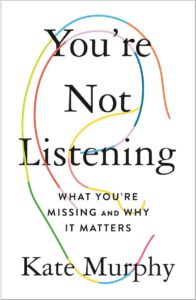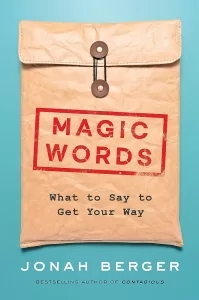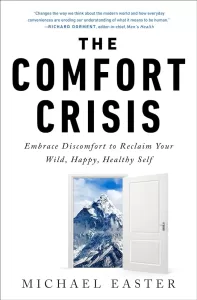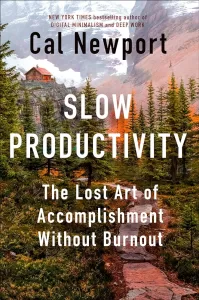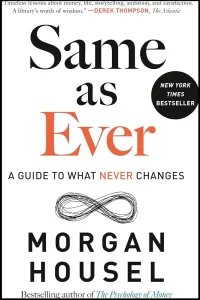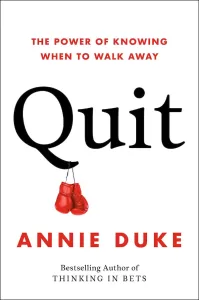Book Review: “You’re Not Listening”
Book: You're Not Listening by Kate Murphy
Reviewer: Bobby Powers
My Thoughts: 10 of 10
If you're only going to read one book this year, I urge you to consider this one. Unlike many other communication books, this one doesn't offer trite advice like "keep eye contact" or "repeat back what you've heard." Journalist Kate Murphy shares the listening advice she's learned from interviewing hundreds of people. She opens the book by saying that the majority of people she's interviewed—even CEOs and celebrities—express how rare it is to have someone truly listen to them. She explains how our society became so horrible at listening (hint: technology hasn't helped), while offering practical tips for how we can become more curious, ask better questions, and truly pay attention to others.
What I Learned from the Book
Avoiding bad behaviors like interrupting others, fidgeting, or checking your phone doesn't make you a good listener. Authentic listening is motivated by humility, curiosity, and a desire to learn. Listening is like meditation—the more you practice it, the more you're able to quiet yourself and discern what's important. Giving someone else your full attention is one of the kindest, most selfless gifts you can give, and it's definitely a skill you can practice and develop.
Selected Quotes and Ideas from the Book
The Lost Art of Listening
- "[W]e are engaged in a dialogue of the deaf, often talking over one another at cocktail parties, work meetings, and even family dinners; groomed as we are to lead the conversation rather than follow it...Value is placed on what you project, not what you absorb."
- "The ability to listen to anyone has been replaced by the capacity to shut out everyone, particularly those who disagree with us or don't get to the point fast enough."
- "When I interview people—whether it's a person on the street, CEO, or celebrity—I often get the sense that they are unaccustomed to having someone listen to them. When I respond with genuine interest to what they are saying and encourage them to tell me more, they seem surprised; as if it's a novel experience."
- "So begets the familiar scene of twenty-first-century life—at cafes, restaurants, coffeehouses, and family dinner tables, rather than talking to one another, people look at their phones. Or if they are talking to one another, the phone is on the table as if a part of the place setting, taken up at intervals as casually as a knife or fork, implicitly signaling that the present company is not sufficiently engaging. As a consequence, people can feel achingly lonely, without quite knowing why."
Why Listening Is So Important
- "It is only by listening that we engage, understand, connect, empathize, and develop as human beings."
- "Done well and with deliberation, listening can transform your understanding of the people and the world around you, which inevitably enriches and elevates your experience and existence. It is how you develop wisdom and form meaningful relationships...We are, each of us, the sum of what we attend to in life."
- "Listening takes effort...But the ability to listen carefully, like the ability to read carefully, degrades if you don't do it often enough. If you start listening to everyone as you would scan headlines on a celebrity gossip website, you won't discover the poetry and wisdom that is within people. And you withhold the gift that the people who love you, or could love you, most desire."
- "[L]listening, more than any other activity, plugs you into life. Listening helps you understand yourself as much as those speaking to you.
Genuine Listening
- "To listen well is to figure out what's on someone's mind and demonstrate that you care enough to want to know. It's what we all crave; to be understood as a person with thoughts, emotions, and intentions that are unique and valuable and deserving of attention."
- "Listening is about the experience of being experienced. It's when someone takes an interest in who you are and what you are doing."
- "You don't need to act like you are paying attention if you are, in fact, paying attention. Listening requires, more than anything, curiosity."
- "To listen does not mean, or even imply, that you agree with someone. It simply means you accept the legitimacy of the other person's point of view and that you might have something to learn from it."
- "The most valuable lesson I've learned as a journalist is that everybody is interesting if you ask the right questions. If someone is dull or uninteresting, it's on you."
- "Try to find what excites them. It doesn't matter if it's their bottle cap collection; if they are passionate about it, it will be interesting."
What Prevents Us from Truly Listening to Others
- "As machines have increasingly competed for our attention over the past century, the average amount of time people have devoted to listening to one another during their waking hours has gone down almost by half, from 42 percent to 24 percent."
- "[P]eople in long-term relationships tend to lose their curiosity for each other. Not necessarily in an unkind way; they just become convinced they know each other better than they do. They don't listen because they think they already know what the other person will say."
- "To make sense of a large and complex world, we unconsciously create file folders in our heads into which we drop people, usually before they even start talking. The categories can be broad stereotypes influenced by our culture or more individualistic based on experience...It's a reflexive mental tendency that gives you the illusion of understanding and, hence, lessens your curiosity and motivation to listen."
- "There is an inverse relationship between signaling and listening. Say you see someone wearing a VEGANS MAKE BETTER LOVERS T-shirt or driving a truck with an NRA bumper sticker. You may feel that's all you need to know about either person. It's also fair to say that they may be so invested in those identities that it does tell you a lot. But it's important to remember that what you know is a persona and not a person, and there's a big difference."
- "In fact, smart people are often worse listeners because they come up with more alternative things to think about and are more likely to assume that they already know what the person is going to say. People with higher IQs also tend to be more neurotic and self-conscious, which means worry and anxiety are more likely to hijack their attention."
How to Become a Better Listener
- "People want the sense you get why they are telling you the story, what it means to them, not so much that you know the details of the story." -Graham Bodie
- "You are the detective, always asking, 'Why is this person telling me this?' understanding that speakers sometimes may not know the answer themselves. Good listeners help speakers figure that out by asking questions and encouraging elaboration."
- "Talking about yourself doesn't add anything to your knowledge base. Again, you already know about you. When you leave a conversation, ask yourself, What did I just learn about that person? What was most concerning to that person today? How did that person feel about what we were talking about? If you can't answer those questions, you probably need to work on your listening."
- "[I]t's helpful to think of listening as similar to meditation. You make yourself aware of and acknowledge distractions, then return to focus."
- "We often miss what people are saying—including their names—because we are distracted sizing them up, thinking about how we are coming across and what we are going to say. Not so when you meet a dog, which is why you can more easily remember a dog's name than its owner's. But if you marshal your mental resources so you fully listen to someone's opening gambit and nonverbal presentation, it's enormously interesting and can quickly clue you in to that person's insecurities and values. And you will be more likely to remember names."
- "The real secret to listening I've learned is that it's not about me. I'm holding my cup out in front of me. I want them to fill my cup and not pour anything in their cup." -Naomi Henderson
Think you’d like this book?
Other books you may enjoy:
Think Again by Adam Grant
How to Win Friends and Influence People by Dale Carnegie
Other notable books by the author:
(None)
